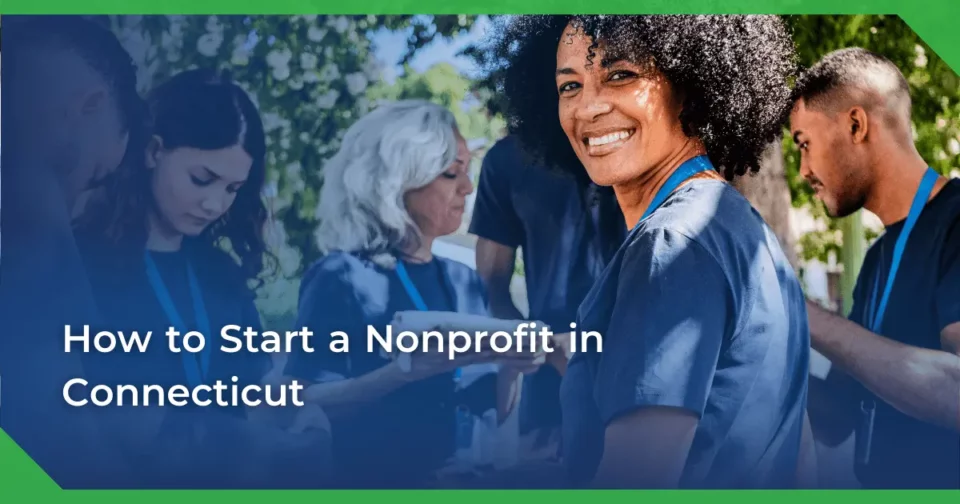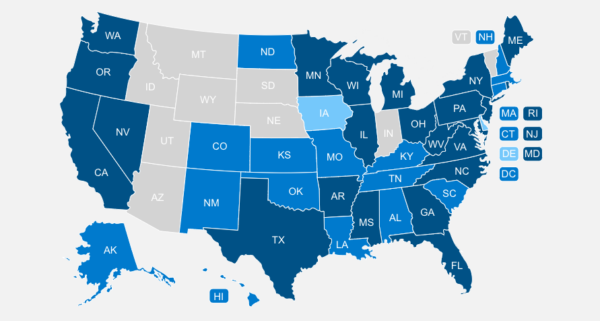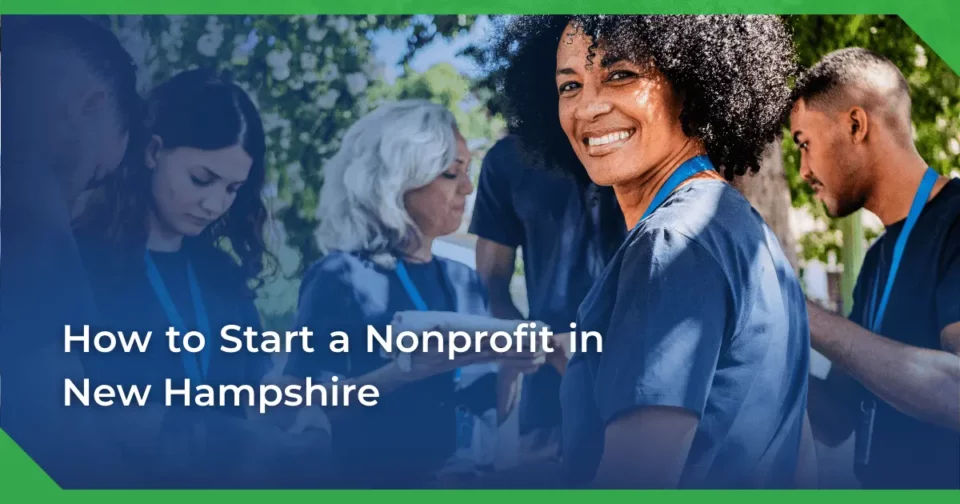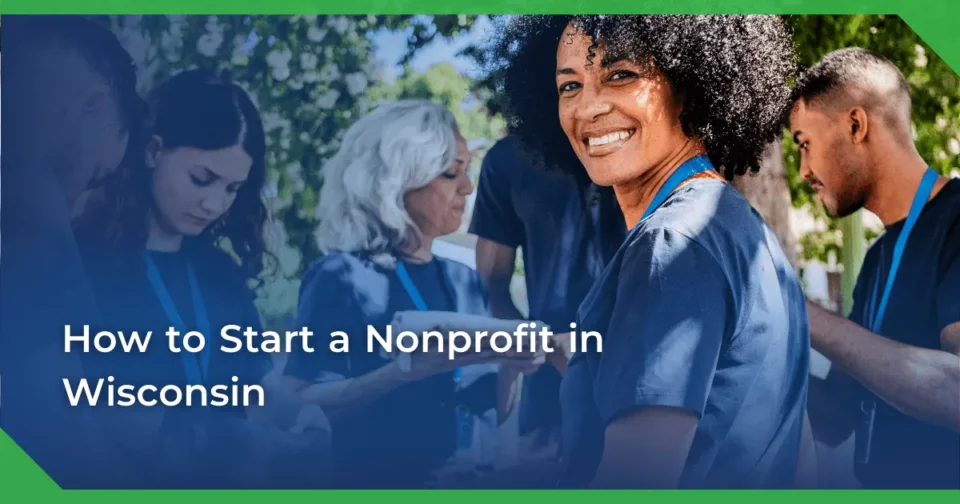
How to Start a Nonprofit in Colorado: Step-by-Step Guide for First-Time Founders
August 26, 2025
How to Start a Nonprofit in Delaware: A Step-by-Step Guide for First-Time Founders
August 26, 2025How to Start a Nonprofit in Connecticut: A Simple Step-by-Step Guide

Ready to make a lasting difference in Connecticut? You’re not alone! Every year, hundreds of passionate individuals like you take the bold step to start a nonprofit in Connecticut, turning their vision for positive change into reality.
Starting a nonprofit might seem overwhelming at first. After all, there’s paperwork to file, boards to establish, and tax exemptions to secure. However, with the right guidance and support from experienced partners like Labyrinth, Inc., you can navigate this journey successfully. With over 35 years of experience and a team of Nonprofit Compliance Specialists—each with 15+ years of nonprofit leadership experience—we provide 1-on-1 support to ensure your organization is set up correctly from the start. Our 100% money-back guarantee on 501(c)(3) approval gives you confidence to move forward.
Think of this guide as your roadmap to creating meaningful change in your community. We’ll walk you through everything you need to know about starting a nonprofit in Connecticut – from understanding the basics to securing your tax-exempt status. Whether you’re passionate about education, healthcare, or community development, this step-by-step guide will help you transform your mission into a thriving organization.
Ready to begin your nonprofit journey? Let’s dive into the essential steps you’ll need to take!
Understanding Nonprofit Basics in Connecticut
Connecticut’s nonprofit sector stands as a powerful force for positive change, employing over 209,356 people – representing more than 14% of the state’s workforce. The sector generates nearly $37 billion in annual revenues and holds assets of $121 billion, demonstrating its substantial economic impact.
What makes Connecticut nonprofits unique
Connecticut’s nonprofit landscape offers distinct advantages for organizations. First and foremost, the state provides a higher exemption threshold compared to other states. While many states require registration for organizations receiving more than $25,000 annually, Connecticut extends this threshold to $50,000.
The state maintains robust oversight through the Department of Consumer Protection (DCP) Charities Unit, which ensures transparency and accountability. This unit maintains a comprehensive registry of nonprofit organizations, allowing donors to verify legitimacy and understand how their contributions are utilized. For more information, refer to the Connecticut Department of Consumer Protection’s guidelines on nonprofit organizations.
Connecticut foundations annually distribute almost $900 million in grants, creating substantial funding opportunities for new nonprofits. Additionally, Connecticut residents demonstrate strong charitable giving habits, contributing over $3.4 billion annually – approximately 2.58% of household income.
Another unique aspect is the state’s unified registration system. Connecticut participates in the Unified Registration Statement (URS) program, simplifying the registration process for organizations operating across multiple states. Through Labyrinth, Inc., you can navigate these registration requirements efficiently, with our specialists handling the state-specific compliance details while you focus on your mission. We even offer drop-off service in Connecticut for faster state processing when needed.
Types of nonprofits you can start
Connecticut offers various nonprofit classifications to align with your mission. The state currently hosts 24,195 active tax-exempt organizations, including 19,085 501(c)(3) organizations. Here are the primary types you can consider:
- Charitable Organizations: These include traditional service providers like food banks, homeless shelters, and community development organizations. They form the backbone of Connecticut’s nonprofit sector.
- Educational Nonprofits: From tutoring services to specialized training programs, these organizations focus on advancing knowledge and skills within communities.
- Religious Organizations: Churches, synagogues, and other religious institutions enjoy special exemptions from certain registration requirements. Consult the DCP’s Charities Guide for details.
- Public Policy Organizations: These groups, often classified as 501(c)(4)s, can engage in political education and advocacy work. Labyrinth supports both 501(c)(3) and 501(c)(4) formations, providing specialized guidance based on your organization’s goals.
Before selecting your nonprofit type, consider that different classifications come with varying requirements. For instance, organizations receiving less than $50,000 annually must still apply for exemption status – it’s not automatically granted.
The state requires most charitable organizations to register with the DCP’s Public Charities Unit and pay an annual non-refundable registration fee of $50. Furthermore, organizations with revenue exceeding $500,000 must provide a financial audit, as outlined in the DCP’s Charities Guide.
Notably, Connecticut’s nonprofit sector continues to grow, particularly in areas addressing emerging community needs. The state’s nonprofits deliver essential services to more than half a million people each year, making it a vital component of Connecticut’s social infrastructure.
Planning Your Nonprofit’s Foundation
Building a strong foundation ensures your nonprofit’s long-term success. Therefore, careful planning becomes essential as you embark on your journey to establish a nonprofit in Connecticut.
Creating your mission statement
Your mission statement serves as the cornerstone of your nonprofit, expressing your organization’s purpose in clear, actionable terms. A well-crafted mission statement should be concise, typically between 5-15 words, avoiding industry jargon or complex language. Instead of using general phrases like “helping people,” focus on specific outcomes your organization aims to achieve.
To create an effective mission statement:
- Define your core purpose and the problem you’re addressing
- Identify your target beneficiaries
- Explain how you’ll deliver value
- Use action-oriented verbs to convey impact
Labyrinth, Inc. recommends involving key stakeholders in crafting your mission statement, as this collaborative approach ensures broader perspective and stronger organizational alignment. Our Nonprofit Compliance Specialists often guide clients through this process during initial consultations, helping refine mission statements to meet both IRS requirements and organizational goals.
Choosing your target community
Identifying your target community requires thorough research and strategic planning. Begin by conducting a needs assessment to understand:
- Current gaps in community services
- Existing organizations addressing similar issues
- Demographic data of potential beneficiaries
- Available resources and potential partnerships
Subsequently, design robust opportunities for stakeholder engagement through surveys, interviews, or focus groups. This approach helps validate your nonprofit’s purpose and ensures your services meet genuine community needs.
Building your initial team
Your nonprofit’s success largely depends on assembling the right team. Start by forming three essential groups:
- Board of Directors: Connecticut law requires a minimum of three board members. However, we recommend using three directors to align with IRS standards for 501(c)(3) organizations. Select individuals who:
- Bring diverse skills and experiences
- Share passion for your mission
- Understand their legal duties
- Can provide direction and oversight
- Staff Planning Committee: This group should include:
- Leadership staff members
- Representatives from different departments
- Individuals with complementary skills
- Stakeholder Committee: Comprise this group of:
- Program participants
- Community representatives
- Potential donors
- Subject matter experts
Remember that your initial team members should understand their roles in establishing essential policies, creating bylaws, and setting strategic direction. Moreover, ensure they commit to measurable goals and approve implementation priorities.
To maintain engagement, consider tying strategic initiatives to board meeting agendas and including regular discussions about organizational direction. This approach keeps your team focused on long-term objectives while managing day-to-day operations effectively.
Legal Steps to Form Your Nonprofit
Once you’ve established your nonprofit’s foundation, it’s time to tackle the legal requirements. The state of Connecticut has specific procedures for officially registering your nonprofit organization.
Selecting your nonprofit name
Choosing the right name requires careful consideration. Connecticut mandates that nonprofit names must include words like “corporation,” “incorporated,” “company,” or their abbreviations. Prior to finalizing your selection:
- Check name availability through the Connecticut Secretary of State’s website
- Ensure the name aligns with your stated purpose
- Verify domain name availability for future web presence
Filing incorporation papers
To officially establish your nonprofit, file a Certificate of Incorporation with the Connecticut Secretary of State (860-509-6200, portal.ct.gov/SOTS). The basic filing fee is $50, with an optional $50 expedited processing fee for same-day service. Through Labyrinth, Inc., you can streamline this process efficiently—we handle all document preparation, ensure accuracy, and can even provide drop-off service for faster processing when Connecticut allows it.
The Certificate of Incorporation must include:
- Organization name and purpose
- Principal office address
- Email address for annual report reminders
- Names and addresses of initial directors
- Registered agent information
- An IRS-approved purpose clause stating your charitable, educational, or other qualifying purpose
- A dissolution clause specifying that upon dissolution, assets will be distributed to other 501(c)(3) organizations
Within 30 days of your initial board meeting, submit the Organization and First Report, which costs an additional $50. This document records:
- Board member details
- Officer appointments
- Corporate structure information
Getting your EIN number
An Employer Identification Number (EIN) serves as your nonprofit’s federal tax ID – essential even if you don’t plan to hire employees. For more details, consult the IRS guidelines on Employer Identification Numbers (EIN). This unique nine-digit identifier enables you to:
- Open bank accounts
- File tax returns
- Apply for tax-exempt status
- Process employee payroll
You must obtain your EIN after incorporating but before applying for tax-exempt status or opening bank accounts. Labyrinth includes EIN acquisition as part of our comprehensive nonprofit formation services, ensuring it’s obtained at the right time and properly documented in your secure client portal.
To obtain your EIN, apply through the IRS website for immediate processing. Alternatively, submit Form SS-4 by mail or fax. Refer to the IRS guidance on obtaining an EIN for exempt organizations. Remember these crucial points:
- Wait until after incorporation to apply for your EIN
- Select “church or church-controlled organization or other nonprofit organization” as your entity type
- Keep documentation safe – your EIN becomes permanently associated with your organization
The IRS presumes your organization is legally formed upon EIN application. Consequently, this starts a three-year period during which you must file required returns to maintain tax-exempt status. For further details, consult the IRS guidance on obtaining an EIN for exempt organizations.
Remember to register with the Connecticut Department of Consumer Protection’s Charities Unit (860-713-6170, portal.ct.gov/DCP). This registration ensures compliance with state regulations and builds credibility with potential donors. We track all these requirements and deadlines for you, sending reminders through your secure portal when action is needed.
Setting Up Your Nonprofit Structure
Establishing a robust organizational structure marks a critical phase in your nonprofit journey. Through proper governance and well-defined policies, you create a foundation that supports your mission’s long-term success.
Forming your board of directors
Connecticut law mandates a minimum of three board members for nonprofits. We recommend maintaining at least three directors to meet both state requirements and IRS standards for 501(c)(3) organizations. When selecting directors, focus on individuals who bring diverse skills and demonstrate passion for your cause. Your board should include members with expertise in:
- Financial management and oversight
- Legal compliance
- Fundraising strategies
- Program development
Through Labyrinth, Inc., you can access resources for identifying qualified board candidates. Our specialists often advise clients on board composition requirements that satisfy both state law and IRS expectations. Board members serve one-year terms initially, although organizations often extend these terms through bylaw provisions.
Each director holds specific responsibilities:
- Attending regular board meetings
- Making informed decisions about organizational policies
- Overseeing financial management
- Evaluating program effectiveness
- Promoting the nonprofit within the community
Writing effective bylaws
Bylaws serve as your nonprofit’s operating manual, establishing crucial governance rules. When drafting bylaws, address these essential components:
- Board structure and responsibilities
- Meeting frequency and procedures
- Voting requirements and quorum definitions
- Officer roles and term limits
- Committee formation guidelines
- Membership criteria (if applicable)
- Amendment procedures
Avoid creating overly restrictive bylaws that might hamper operational flexibility. Labyrinth provides bylaw templates customized for Connecticut nonprofits, ensuring compliance with state requirements while maintaining operational flexibility. Remember to review and update bylaws every two years to ensure they reflect your organization’s current needs and growth.
Creating essential policies
Developing comprehensive policies safeguards your nonprofit’s interests and ensures smooth operations. Start with these fundamental policies:
- Conflict of Interest Policy
- Define potential conflicts
- Establish disclosure procedures
- Outline resolution processes
- Document annual reviews
- Financial Management Policy
- Set budget approval procedures
- Define spending authorities
- Establish audit requirements
- Create reporting schedules
- Board Governance Policy
- Define board member qualifications
- Establish recruitment procedures
- Set performance expectations
- Outline removal processes
Organizations receiving over $50,000 annually must implement additional financial oversight measures, whereas those exceeding $500,000 require independent audits. Consider forming specialized committees to oversee policy implementation and compliance.
Your nonprofit’s success depends significantly on maintaining clear documentation of all policies and procedures. Store these documents securely yet make them accessible to relevant stakeholders—something easily managed through Labyrinth’s secure, SOC 2 Type II compliant nonprofit portal. Regular policy reviews ensure continued effectiveness and alignment with organizational goals.
Remember that Connecticut nonprofits must prepare meeting minutes and authenticate corporate records through designated officers. Although one person can hold multiple officer positions, the roles of president and secretary must remain separate to maintain proper checks and balances.
Securing Tax-Exempt Status
Obtaining tax-exempt status marks a crucial milestone in your nonprofit journey. Through proper documentation and adherence to specific requirements, you can secure both federal and state tax benefits for your organization. Remember that forming your nonprofit corporation is just the first step—you must separately apply for federal tax-exempt status to make donations tax-deductible and qualify for various benefits.
Federal tax exemption process
To gain federal tax-exempt status under section 501(c)(3), submit Form 1023 or Form 1023-EZ to the IRS after incorporating and obtaining your EIN. Organizations with gross receipts under $50,000 and assets below $250,000 might qualify for Form 1023-EZ, a streamlined version that costs $275. Otherwise, the standard Form 1023 application fee is $600.
Labyrinth, Inc. recommends filing your exemption application within 27 months of incorporation. This timing ensures your tax exemption takes effect from your incorporation date, making all donations received since then tax-deductible. We prepare and file either Form 1023 or 1023-EZ based on your organization’s qualifications, backed by our 100% money-back guarantee on IRS approval.
The application requires:
- Detailed narrative of organizational activities
- Financial statements or projections
- Compensation information for key personnel
- Proof of appropriate legal structure
- Supporting documentation
Upon approval, you’ll receive a determination letter confirming your tax-exempt status. This process typically spans three to eighteen months for standard Form 1023, yet Form 1023-EZ applications often receive responses within two to four weeks. Throughout this period, we monitor your application status and handle any IRS correspondence, keeping you informed through your secure portal.
State tax exemption requirements
In Connecticut, state tax exemption procedures require separate applications after securing federal tax-exempt status. Once you receive your IRS determination letter, submit it to the Connecticut Department of Revenue Services (860-297-5962, portal.ct.gov/DRS) along with the appropriate state exemption applications.
Connecticut offers several tax benefits:
- Exemption from state corporate income tax
- Relief from sales and use taxes on qualifying purchases
- Property tax exemptions (subject to local regulations)
For sales tax exemption, complete CERT-119 and attach your federal determination letter. Organizations hosting events should note specific requirements:
- Submit CERT-112 three weeks before events involving meals or lodging
- Qualify for tax-free sales at up to five fundraising events annually
- Maintain proper documentation of exempt transactions
The state accepts two forms of proof for tax exemption:
- Federal determination letter from the IRS
- Connecticut exemption permit (E-Number) issued before 1995
Nonprofits must also register with the Department of Consumer Protection’s Public Charities Unit to solicit donations in Connecticut. Organizations receiving over $50,000 annually face additional oversight requirements, while those exceeding $500,000 must provide financial audits. As part of our bundled services, Labyrinth includes first-year fundraising registration to ensure you’re compliant from day one.
Remember that unrelated business income remains taxable at both federal and state levels. Maintain detailed records of all financial transactions and submit required annual reports including Form 990 to the IRS and state annual or biennial reports to preserve your tax-exempt status. These ongoing obligations ensure your organization maintains its tax-exempt benefits while remaining transparent to regulators and the public.
The Department of Revenue Services no longer issues new exemption permits but honors those granted before July 1995. This policy streamlines the process, as organizations now primarily rely on their federal determination letter for state tax benefits.
Conclusion
Starting a nonprofit in Connecticut requires dedication and attention to detail, but the impact you can create makes it worthwhile. The state’s robust nonprofit sector, higher exemption thresholds, and strong charitable giving habits provide an excellent foundation for your mission.
Professional guidance can make this journey smoother and more efficient. Labyrinth, Inc. combines expert service with modern technology to handle your nonprofit’s formation from incorporation through IRS approval. With our 100% money-back guarantee on 501(c)(3) approval, transparent pricing with no hidden fees, and experienced Nonprofit Compliance Specialists providing 1-on-1 support, you can focus on your mission while we handle the complexities. Track every step in real-time through your secure client portal and rest assured that your nonprofit is being formed correctly from the start.
Above all, remember that success comes from thorough planning, strong governance, and proper compliance. Your careful attention to legal requirements, board formation, and policy development will build trust with donors and stakeholders. Finally, maintaining accurate records and staying current with state regulations will ensure your nonprofit thrives while making meaningful changes in your community.


![Your 501(c)(3) Approval Guaranteed{{ include_custom_fonts({"Museo Sans":["Bold","Bold Italic","Regular","Regular Italic"]}) }}](https://no-cache.hubspot.com/cta/default/560178/interactive-194101957210.png)
![Start Your Nonprofit with Confidence{{ include_custom_fonts({"Museo Sans":["Bold","Bold Italic","Regular","Regular Italic"]}) }}](https://no-cache.hubspot.com/cta/default/560178/interactive-194101957151.png)








